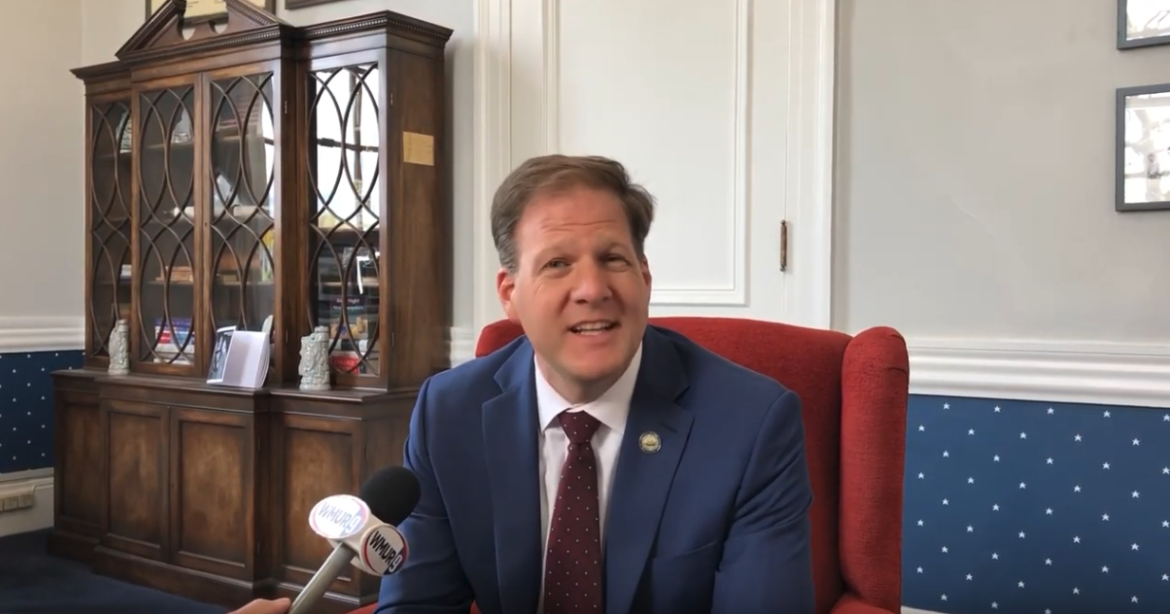By GARRY RAYNO, InDepthNH.org
CONCORD — The day before the House and Senate decide their differences on bills that both chambers passed, Gov. Chris Sununu offered compromises and red lines he will not cross Wednesday on the state’s two-year operating budget.
The House is expected to ask the Senate to negotiate changes it made to the $13 billion two-year, budget passed last week with negotiations set to begin Tuesday at 10 a.m.
On Wednesday, Sununu held a press conference to say where he could agree, where he couldn’t and areas that needed further negotiations.
While offering a “roadmap to common ground” he said he would veto a budget that includes paid family and medical leave, which he has called an income tax, and roll backs in business tax rates scheduled to begin this calendar year.
The two provisions are in both the House and Senate budgets and are top priorities for both Democratically controlled chambers.
“I think we will find some amazing common ground,” Sununu said. “Everyone really wants to get this done, and I have hope we can really get there.”
The two-term governor offered proposed changes to education funding reforms in the budget, rate increases for Medicaid providers, and a new Secure Psychiatric Unit.
The House and Senate restored stabilization grants to school districts to their original level before annual 4 percent reductions began three years ago, created a commission to study the cost of an adequate education and changes to state aid, and reestablished disparity aid but at different levels. The House increased state education aid by $160 million while the Senate plan is slightly less than $100 million.
Sununu said he would agree to increasing stabilization aid but at a lower level than the House and Senate.
Sununu suggested targeted Medicaid provider rate increases instead of across-the-board 3.1 percent annual increases proposed by the Senate, and reducing the cost from about $52 million to $30 million. He said he believes the department should have flexibility.
Health and Human Services Commissioner Jeffrey Meyers wrote a letter Tuesday to the House and Senate finance committee chairs suggesting his department “develop a plan to distribute the funds allocated in HB2, based on rate history, rate increases proposed in other legislation, and with input from providers. This plan will require legislative approval and will ensure the State’s most pressing needs will be effectively addressed.”
Meyers floated a similar proposal during the final days of Senate Finance Committee budget work, but providers met and told the committee they preferred the across-the-board 3.1 percent annual increases, which the committee included in the budget.
Sununu had proposed a 60-bed forensic hospital costing $26 million during his budget address, while the Senate approved a 25-bed Secure Psychiatric Unit facility costing $17.5 million. On Wednesday Sununu proposed a compromise – a 36-bed facility.
And Sununu agreed to a $40 million revenue sharing plan with cities and towns instead of the $52 million Capital Infrastructure Revitalization Fund he proposed in his budget.
He also focused on taxes saying the legislature’s mandatory paid family and medical leave plan is funded by an income tax, and that will not happen on his watch.
“With an income tax it will be vetoed,” Sununu said. “That’s an income tax in New Hampshire. I mean let’s remember what New Hampshire is all about. Let’s remember what live free or die is all about. Let’s remember, why are we so successful? Why do we have opportunity today that other states don’t?”
And he said lawmakers should not be raising business tax rates when business tax revenues are several hundred million dollars in surplus. “This is a line I will not cross, a line we don’t need to cross,” he said. “This is not the right time (to raise taxes).”
The House and Senate have approved retaining business tax rates at 2018 levels instead of lowering the rates for this calendar year, as the current law would do. Freezing the rates produces about $90 million.
The two issues will be major hurdles in negotiations between lawmakers and the governor.
Senate Finance Committee Chair Sen. Lou D’Allesandro, D-Manchester, told the Associated Press the budget cannot be constructed without the revenue from the business tax rate freeze, but said there is room to negotiate with the governor on other areas of the budget.
House Majority Leader Doug Ley, D-Jaffrey, said budget negotiations begin next week in the committee of conference and with the governor.
“In a negotiation no one party will get everything that they want, but I am confident we will form a compromise that will work for all parties and the people of New Hampshire,” he said.
Not the Budget
The House and Senate meet Thursday to review changes the other body made to their bills.
Lawmakers will determine if they will agree to the changes, whether they disagree and want to negotiate a compromise or if they cannot agree and kill the bill.
Among the bills lawmakers will have to decide Thursday are the capital budget, and a series of bills tightening gun purchasing requirement like background checks, waiting periods and banning firearms from school zones.
Other bills deal with voting rights, and another bill would allow people on medical marijuana and their care givers to grow their own, and another bill establishes an independent redistricting commission.
Other disagreements will be over what to do with carbon auction proceeds from the Regional Greenhouse Gas Initiative program, sports betting, and suicide prevention education in schools.
The House and Senate meet at 10 a.m.
Most conference committees will begin work Tuesday and have a Thursday deadline to file reports.
The conference committee reports have to be voted on by June 27. The new fiscal year begins July 1.
Garry Rayno may be reached at garry.rayno@yahoo.com





